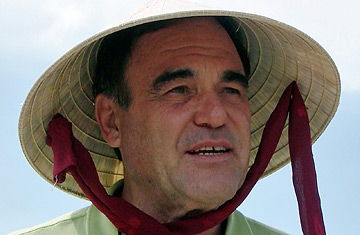
Director Oliver Stone in Vietnam, September 2007
Oliver Stone honestly thought he was finished with the Vietnam War. With Best Director Oscars for Platoon (1986) and Born on the Fourth of July (1989), and with 1993's Heaven & Earth to round out his Vietnam trilogy, the director had moved on to more current topics. Last year's World Trade Center centered around rescue workers on 9/11. Any Given Sunday (1999) was set on American football fields, not battlegrounds. So what was the 61-year-old filmmaker doing sitting in an airport lounge in Danang this week, watching himself lighting incense during a temple visit on local television news? Researching another Vietnam movie, of course. His latest project, Pinkville, focuses on the investigation into the 1968 My Lai massacre, in which U.S. troops slaughtered as many as 500 unarmed Vietnamese villagers. He spoke to TIME Vietnam correspondent Kay Johnson about parallels between Vietnam and the Iraq conflict, his old Yale classmate George W. Bush and why he won't be making the Great Iraq War Movie.
After 15 years since Heaven & Earth, why another Vietnam movie? Why now?
Why now? Because of Iraq. That's a major reason. I had no intention of making a fourth Vietnam movie at all. But this last year — you know my feelings about the Iraq war of course — I think the time has unfortunately come back around to remember events like My Lai.
Why My Lai? Because it's a great story. I was [serving] in Vietnam at the time, and it really made an impression, and I think it changed the course of the war to a large degree. Americans were shocked, as well as the Vietnamese. You have to take into account that many Vietnamese villagers were neutral. It turned many neutral villagers against us. It was an interesting turning point.
As a veteran yourself, do you understand how it could have been easy for soldiers to cross that line?
Not easy, but I can understand it. I mean, you saw a bit of it in Platoon. Not on this scale. But that's part of what the movie shows, visualizes, dramatizes — the peer pressure, the tension. [My Lai] happened. It's a fact. It's history. I'm not seeking to denigrate the average soldier. There was a breakdown in that division and there was a breakdown from the top. And I think it had a lot to do with the war policy, which was basically body counts, kill ratios, search and destroy, free-fire zones — these concepts, when they are allowed to grow, grow out of hand. And they got out of hand in many cases. My Lai is one of them.
The Vietnam War was obviously a formative experience for you; you've made three movies about it.
I don't consider this next movie like the other Vietnam ones, because they were all personal, those stories. There's me in Platoon. There's [Vietnam veteran] Ron Kovic in Born on the Fourth of July. And in Heaven & Earth, there's Le Ly Hayslip [the Vietnamese woman whose life is dramatized in the film, and who accompanied Stone on his trip to Danang]. All three were personal stories.
My Lai is more like World Trade Center in that it's outside my own personal whatnot, it's outside me and it's an event of historical proportions. But it seems that there's so many similar things [between Vietnam and Iraq]. Sometimes the best way to reflect on something is through parallel history. Patton came out during Vietnam; Little Big Man came out during Vietnam; M*A*S*H* came out during Vietnam. They were all about other wars. Sometimes you can tell more about a war now by paralleling a previous war.
Speaking of parallels, President Bush recently made the case that the lessons from the aftermath of the Vietnam withdrawal is reason to stay in Iraq. Any thoughts?
Now that's despicable. The man went to Yale, but he never went to class. Obviously he didn't learn history. Anyone who knows anything about Vietnam would know that it was not the American withdrawal that precipitated chaos in this area. It was quite the opposite. It was the American invasion that precipitated the chaos. I don't think he was a good student. I was in the same class with him at Yale — '68. I left, he stayed. But he didn't learn his lessons.
You've been to Cuba, you've interviewed Castro, so you seem to have no personal problem with socialism. What do you think about the communist-run system here in Vietnam now?
I don't know enough about it here. I'm not a fan of socialism. I never was. I made that clear and told people when the Castro documentary came out. I believe in a fair market, but the market sometimes has excesses. And Cuba, economically, is not an example for the rest of the world.
Do you think you'll make an Iraq movie eventually?
It's a good subject, but you know, it's another generation's war. I think it could be told better by someone who has really lived it like I lived Vietnam. But I'm interested in the politics of what happened behind it. That fascinates me. Right now the surge — it resembles a lot of the Vietnam stuff because we always heard that there was a light at the end of the tunnel. That was a very consistent quote: "It's changing, it's getting better, [another] six months, another 100,000 troops." We heard that again and again and I think any Vietnam veteran or person of my age from that era will tell you that it's very similar. False hope.
